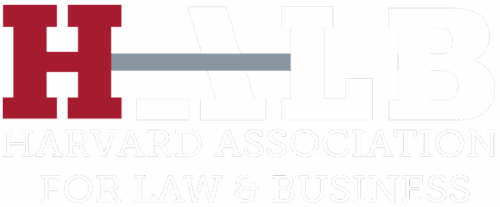New York 2025
HALB Domestic Trek 2025 — New York
On October 24, 2025, HALB embarked on its annual domestic trek to New York City, offering members the opportunity to connect with leading firms, explore diverse career paths, and engage with alumni across industries. Over two packed days, students met with professionals in law, finance, and beauty!
The trip began with breakfast with Weil, Gotshal & Manges, where students met with partners and associates across the firm’s M&A, litigation, and restructuring practices. Students then met with representatives from Burford Capital, who shared enlightening perspectives on litigation finance and how the field is reshaping access to capital and the business of law.

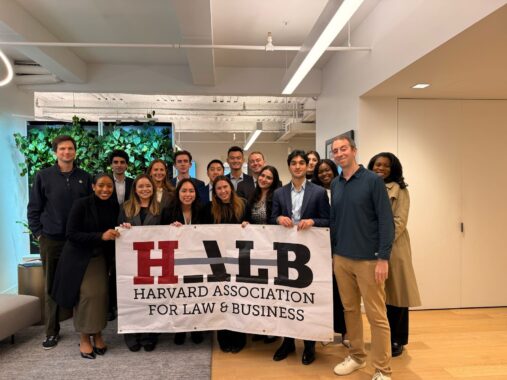
Members visited Paul Hastings for a lunch panel with associates in both corporate and litigation groups. In the afternoon, the group met with Aditi Venkatesh, General Counsel of Glossier, for a conversation about in-house practice at a global beauty brand. The day concluded at Sullivan & Cromwell with a panel and happy hour with attorneys from the firm.
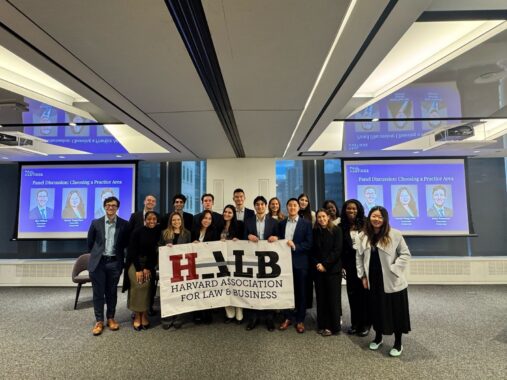

The final day of programming wrapped up with a HALB Alumni Mixer, bringing together current members and over 25 New York-based alumni.
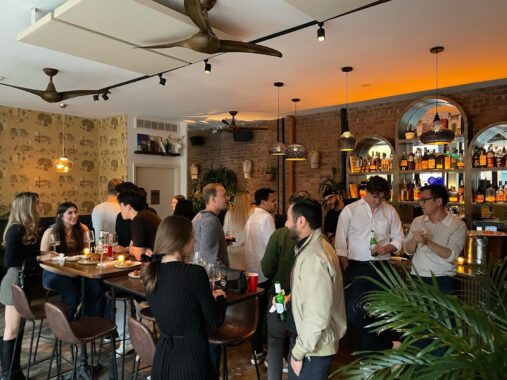
Through these experiences, participants gained insight into New York’s dynamic legal market, the wide range of practices that define the city’s legal landscape, and the various opportunities available for future lawyers in the business world and in-house roles!
Singapore 2025
HALB International Trek 2025 — Singapore




In March 2025, HALB traveled to Singapore for its 7th annual international trek, exploring one of Asia’s most dynamic business and legal hubs.
The trek opened with a visit to Amazon Singapore, where participants learned about the company’s expanding presence in Asia and the legal challenges that accompany cross-border technology and e-commerce. Students then joined a session at Sidley Austin’s Singapore office, meeting with attorneys practicing across corporate, capital markets, and international arbitration.
The highlight of the week included an in-depth program at Allen & Gledhill LLP, one of Singapore’s premier law firms. HALB participants met with partners across corporate M&A, capital markets, banking & finance, and international arbitration, gaining first-hand perspective on the interplay between local and regional markets.
The professional programming concluded with a visit to L’Oréal Singapore, where the company’s legal team provided insight into the intersection of law, branding, and consumer products in a global setting.
Throughout the trek, students were able to compare the opportunities and challenges of practicing law in Asia with those in the U.S., while also building connections with practitioners at the forefront of Singapore’s legal and business community.
Dubai 2024
HALB International Trek 2024 – Dubai
In March 2024, HALB traveled to Dubai to explore one of the world’s most dynamic commercial and legal centers. This was HALB’s 6th annual international trek! Over the course of the trek, participants engaged with leading law firms, corporations, and financial institutions that shape the Middle East’s business landscape.
The trek opened with a visit to Gibson, Dunn & Crutcher LLP, where the partner-in-charge and associates shared insights on the firm’s corporate and arbitration practices across the MENA region. Students then met with executives from Dynamic Drilling, gaining perspective on offshore energy operations and the legal complexities of joint ventures in global drilling markets.
Later in the week, the group joined a program at Freshfields Bruckhaus Deringer, where practitioners in international arbitration, M&A, and commercial litigation offered perspectives on cross-border transactions and disputes in the Middle East. HALB also had the opportunity to connect with Mashreqbank, where Acting Group General Counsel Janan Andary Nasr discussed navigating legal risk in international banking and the evolving role of Islamic finance.
Participants also visited the Emirates Group, engaging with the in-house legal team of one of the world’s largest aviation companies to better understand the intersection of aviation, compliance, and data privacy. The trek concluded with a session at Siemens Energy, where senior legal counsel highlighted the company’s role in decarbonization projects across Dubai and the broader region.
Through these meetings, students gained exposure to a broad spectrum of industries—energy, finance, aviation, and global law—while also deepening their understanding of how Dubai serves as a strategic hub for cross-border legal practice.
Miami 2024
HALB Domestic Trek 2024 — Miami
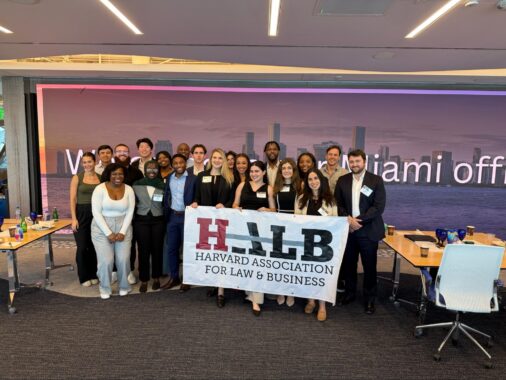
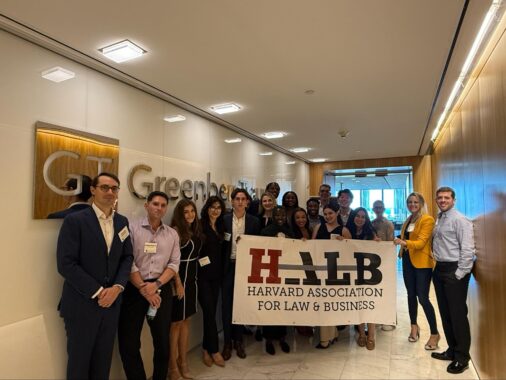
In October 2024, HALB brought students to Miami for its annual domestic trek, offering participants a unique opportunity to engage with leading firms and corporate legal departments in South Florida.
The trek began with a visit to McDermott Will & Emery, where students toured the Miami office and joined a fireside chat with partners and associates from healthcare, corporate advisory, and litigation practices. This was followed by an inside look at Restaurant Brands International (Burger King), where the group met with General Counsel and Corporate Secretary Jill Granat for a candid discussion about in-house practice and even toured the company’s test kitchen.
That evening, students attended a cocktail reception hosted by Greenberg Traurig at the firm’s founding Miami office, engaging with senior leaders including Miami Co-Managing Shareholder Jaret Davis. The day concluded with dinner and networking with attorneys from Kirkland & Ellis.
The final day of programming included a breakfast and panel at Weil, Gotshal & Manges, followed by a lunch program with White & Case, where students joined practice area roundtables and concluded the trek with networking over Miami’s signature cafecito.
Through these experiences, participants gained insight into Miami’s growing legal market, the diverse range of practices represented in the city, and the unique opportunities available for future lawyers in both private practice and in-house settings
Europe 2023
Harvard Association for Law and Business student delegation visits London for the fifth-annual International Trek
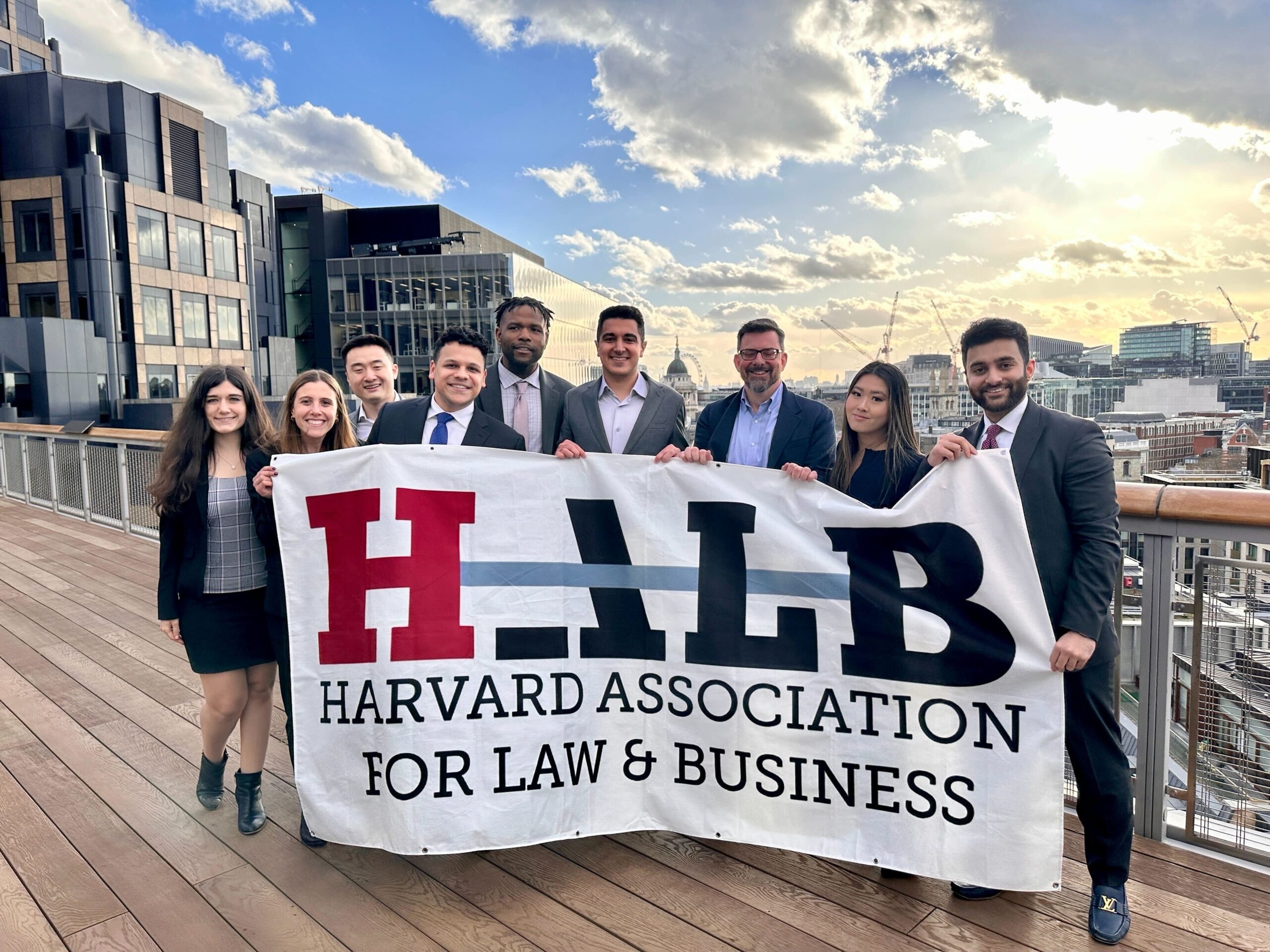
Source: Grit Daily, April 2023
On March 13th, the Harvard Association for Law and Business (HALB) student delegation traveled to London for HALB’s fifth-annual International Trek. The delegation was composed of eight talented students and was led by Saeed Ahmad 24’ and Nicholas Gonzalez 24’. The trip aimed to give pupils the opportunity to meet chief officers, executives, and partners of world-renowned law firms, investment banks as well as multinational consumer goods companies and learn from their work experience. “One of the key tenets of HALB is to introduce students to the various opportunities present at the intersection of law and business and to introduce a global perspective,” said Mr. Ahmad, one of the two people who led the coalition.
HALB’s fifth-annual International Trek started with a visit to the UK Supreme Court. Here students had the chance to have a tour of this historical building, where they admired works of art celebrating the role of women in law over the last hundred years and venturing into the Justice’s Library. Harvard students also had the opportunity to sit in a criminal hearing while also engaging in conversations with barristers, solicitors, and judicial assistants.

The following day, Tuesday 14th, the students headed to the headquarters of Unilever, a British-Dutch multinational consumer goods company, selling a variety of products ranging from food to drinks and cleaning supplies to over 190 countries. The HALB student delegation also had the pleasure to meet the company’s global CLO, Maria Varsellona, to discuss the current state of the company. This was followed by a meeting in which Unilever’s Chief IP Officer, Sarah Orchard, and Chief Business Integrity Officer, Kim Morgan-Verlaque, talked about the necessity to manage and protect Unilever’s most valuable intangible patents, copyrights, and assets.
Following the meeting, the students went to the headquarters of DLA Piper, a multinational law firm with offices in over forty countries and the sponsor for this year’s trek. Here they took part in a roundtable discussion in which three DLA Piper partners, Stephen Bottley, Martin Bartlam, and Ruth Hoy, discussed the law firm’s emerging legal issues as well as the day-to-day roles of its associates. This was soon followed by a Q&A with executives from Silicon Valley Bank, the perfect opportunity for the delegation to learn about the bank’s recent collapse and consequent acquisition by HSBC UK.
On Wednesday the 15th, the HALB student delegation traveled to London’s Canary Wharf, part of London’s central business district, to visit the Morgan Stanley offices. This American multinational investment bank and financial services company has over 75,000 employees all over the world and clients which include governments, institutions, corporations, as well as individuals. Here, the students had a meeting with Managing Director Barra Little, a Harvard Law School alum. In the interactive Q&A session, Mr. Little discussed tips on how to advance in a dynamic company, as well as the ideal way to transition between legal and business roles.

On Thursday the 16th, the delegation had the honor of meeting Jeremy Barker, the Legal Director of Moët Hennessy Europe, Through to this meeting, Harvard students learned about the company’s strategy in the Europe/Middle East Region, the day-to-day roles of a legal director, as well as the importance of networking in the industry.
On their last day, Friday the 18th, the delegation went to Patron Capital, a European private equity real estate fund, representing roughly 4.0 billion euros of equity across several funds and related co-investments. Here, they met the founder and managing partner Keith Breslauer as well as senior advisor Farhod Moghadam who talked about the legal/compliance matters in connection to real estate and private equity.
“This London Trek showcased the diversity of global business through our visits to companies such as Unilever, Moët Hennessy, Silicon Valley Bank, Morgan Stanley, Patron Capital and even government entities such as the Supreme Court of the United Kingdom,” said Mr. Ahmad.
Europe 2022
Harvard Association for Law and Business returns to Europe post-Covid
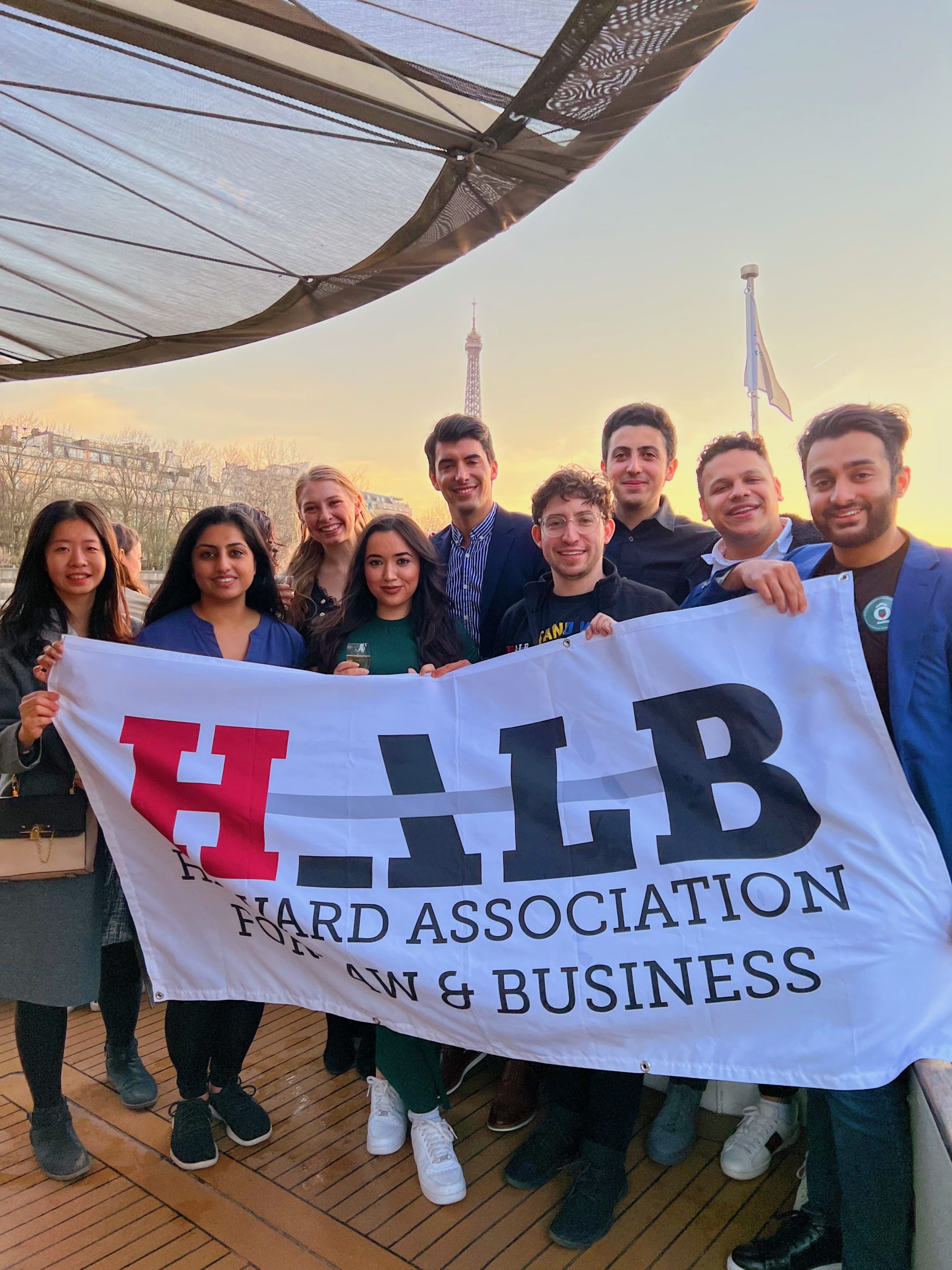
Last semester, Harvard Association for Law and Business (HALB) visited Paris, France as part of its annual international trek. HALB Co-President Elisabeth Lopez and Treks Director Aaron Mashian planned the trip to center around business, legal, and government leaders in Paris, a multicultural city with a bustling economy.
This trip was the first of its kind after two years of Covid restrictions. Attendees visited the European Space Agency, Lazard Investment Bank, LVMH, Morgan Lewis LLP, the Organization for Economic Cooperation and Development, BNP Paribas, and more.
Morgan Lewis LLP generously sponsored the trek.
Europe 2018
Harvard Association for Law and Business leads student delegation to Europe
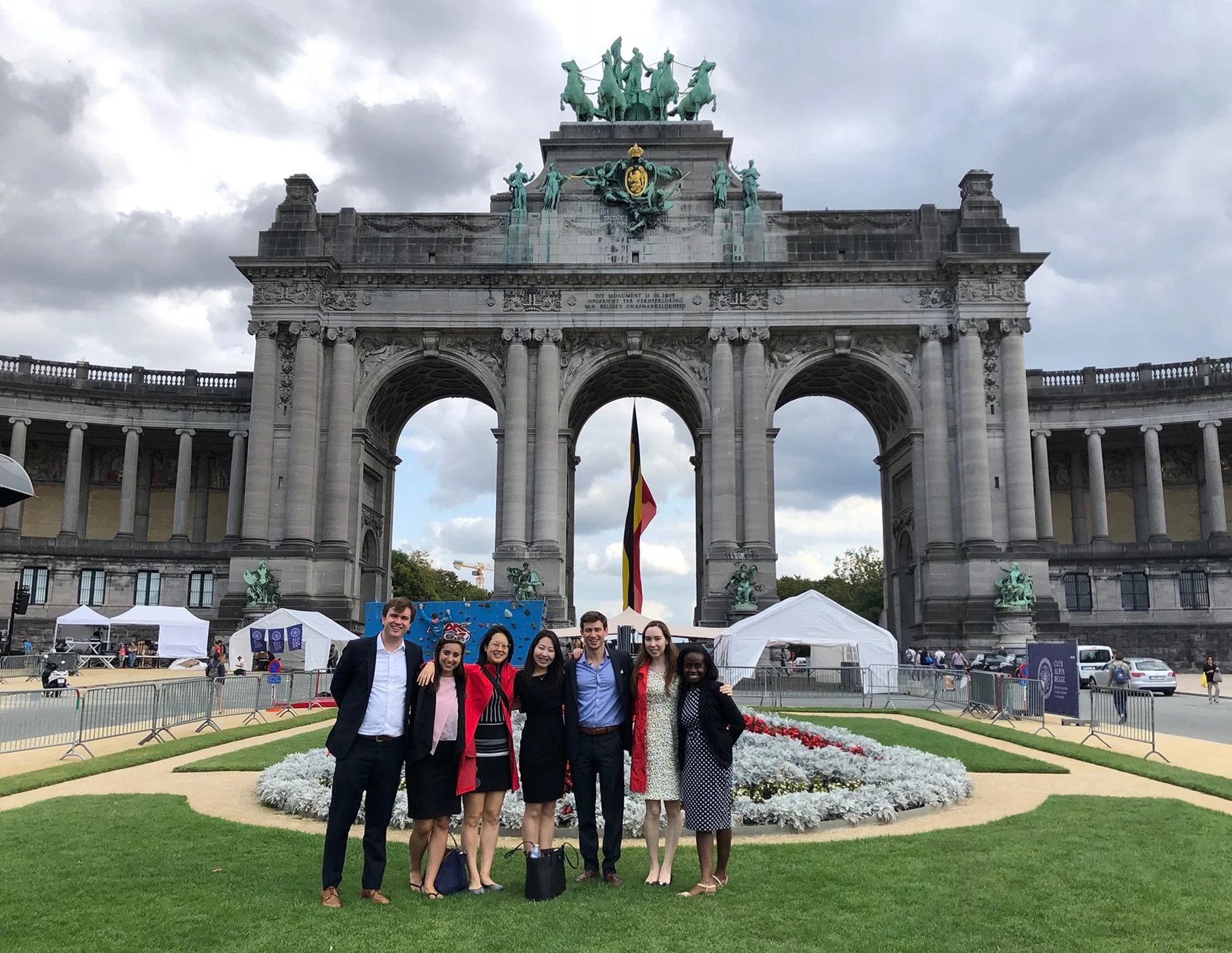
A student delegation from the Harvard Association for Law and Business (HALB) visited business, legal, and government leaders in London and Brussels, Belgium, in late August, as part of HALB’s second-annual International Trek. While last year’s trek across China was centered around the country’s rapid emergence as one of the world’s most powerful economies, this year’s trek was intended to give students exposure to international business and global leadership in a post-Brexit Europe.
HALB co-presidents Elizabeth Ferrie ’19 and Heather Lee ’19 chose Europe for the trek’s destination because they thought London and Brussels perfectly aligned with the International Trek’s core mission of exposing students to business leadership lessons in a global context.
“After participating in HALB’s first-ever International Trek to China in 2017, we were inspired to cultivate a similar experience for students,” said Ferrie. “We thought the theme of Europe while Brexit negotiations continue nicely followed the China Trek’s exploration of themes such as the business implications of rapid economic change and political uncertainty.”
Ferrie was quick to add that the International Trek would not have been possible without global law firm Morgan, Lewis & Bockius, stating, “I pitched the idea to Jami Wintz McKeon, Chair of Morgan, Lewis & Bockius, over lunch while she was on campus for a HALB Women’s Leadership Speaker Series event, and she was incredibly supportive.” Morgan Lewis is the largest law firm chaired by a female.
In London, the delegation visited Spotify, the multi-billion-dollar music streaming service that just completed its direct listing on the New York Stock Exchange in April. At the company’s office in Soho, London, the students met with two members of Spotify’s legal team, Jo Lalor and Tony Woods. Kike Aluko JD/MBA ’19, who previously interned in Spotify’s New York office and aspires for a career in the music industry, found the visit to be especially insightful. “Our visit at Spotify helped to illuminate not only the legal issues facing the music industry as a whole, but also how in-house lawyers at Spotify are helping to shape the future of the music business,” she said.
The students later received a tour of London Stock Exchange Group and engaged in a roundtable conversation with LSEG leaders including Murali Subrahmanyam, Head of Business Services Ltd (BSL) Core Services, LSEG shared services company, James Kerton, Head of Legal & Corporate Transactions, Gavin Sullivan, Group Director of Communications, and Adam Scheuer, International Government Relations Manager.
The discussion, which Scheuer described as a “stimulating exchange,” was far-reaching and ranged from LSEG-specific topics—such as its multifaceted business model and its extraordinary commitment to corporate social responsibility (e.g., LSEG’s ELITE program/platform and its “Companies to Inspire” initiative in Africa and Europe)—to general academic topics such as artificial intelligence, blockchain technology, international relations, and even applied physics.
Notably, a few weeks before HALB’s visit, Harvard Law School alumni David Schwimmer ’96 stepped into his role as chief executive officer of LSEG, a position to which he was appointed in April.
HALB’s London tour included office visits to Morgan Stanley and Google. At both companies, the delegation met with individuals who were Harvard Law School alumni working in global careers outside of the legal industry, and discussions focused on individual career growth and the value of a Harvard Law School education across disciplines. At Morgan Stanley, the HALB delegation had a small-group discussion with Mandy DeFilippo ’00, managing director and head of risk management for Fixed Income and Commodities in Europe, the Middle East, and Africa. DeFilippo, who is also the first female to serve as chair of the International Capital Market Association in the organization’s 50-year history, provided the HALB delegation with invaluable career advice as she explained her fascinating journey from classically training as a flutist at Julliard, to studying humanities as an undergraduate at Columbia, to attending Harvard Law School and deciding to practice law in London, to transitioning from working as a corporate lawyer to working as an investment banker.
At Google, the students met with Amrit Dhir ’13, who currently maintains two jobs at the company: acting head of Campus London and senior global operations and expansion lead for Google for Entrepreneurs. Unlike DeFilippo, whose career has included a number of years as a practicing lawyer, Dhir explained that while he loved law school, he realized within his first three weeks at HLS that he didn’t want to work as a practicing lawyer. As such, Dhir spent much of his three years at HLS hustling—first to obtain a 1L legal internship at Google, and subsequently, to leverage his Google legal internship into a full-time business development job at the company. Amy Zhang ’20 found Dhir’s career path inspiring, stating, “Alums like Amrit are living proof that law students don’t have to settle for a job. You can go out, strive, and find the work you dream to do.”
In between the visits with DeFilippo and Dhir at Morgan Stanley and Google, respectively, the students were hosted by a number of lawyers, including partner Louise Skinner, for a meet-and-greet at Morgan Lewis’s London office.
The students took the Eurostar train from London to Brussels, marking the beginning of the second—and final—leg of the trek. Unlike the delegation’s itinerary in London, which was focused on private-sector enterprises, the Brussels itinerary was primarily comprised of visits to governmental offices, as Brussels is home to the many international political organizations’ headquarters, such as the European Union (EU) and North Atlantic Treaty Organization (NATO).
In Brussels, HALB’s delegation had several meetings with individuals at the European Commission, Directorate-General for Competition—including a mergers-focused economist, an antitrust economist, and a communications expert. Though none of the students in the HALB delegation had taken an antitrust course at HLS to date, many of the topics that were discussed built on legal concepts the group had learned about in their required 1L International and Comparative Law courses such as “Law and the International Economy,” taught by Professor Mark Wu.
Later that day, the students visited the Council of the European Union for a meeting with Dr. Christiane Höhn LLM ’03, who serves as principal advisor to the EU Counter-Terrorism Coordinator. Höhn emphasized how enriching the broader Harvard ecosystem was during her time at Harvard Law School—she spent significant time at Harvard’s Kennedy School of Government working with Professor David Gergen ’67—and encouraged the HALB delegation to similarly explore complementary areas of interest outside of the Law School.
The final visit was to Morgan Lewis’s Brussels office, where the students took part in an insightful roundtable discussion on EU antitrust law with partner Christina Renner and associate Petra Kupka.
China 2017
HALB China Trek offers students perspectives on global leadership

On Aug. 28, a student delegation from the Harvard Association for Law and Business (HALB) embarked on a week-long trip through Shanghai, Hangzhou, and Beijing, China. The purpose of this first-ever HALB China Trek was to expose students to the unique lessons from the rapid development of China’s global economy.
In prior years, HALB members have met with legal and business leaders in Boston and New York City, but this year, HALB Co-presidents Jianjian Ye ’18 and David Kafafian ’18 decided to find an opportunity for students to explore firsthand one of the world’s fastest growing economies.
“The core mission of HALB is to connect students with leaders at the intersection of law and business and to cultivate leadership,” said Ye. “In today’s world, it is imperative for us to understand our mission in a more globalized context. This China Trek exemplifies our efforts to offer more opportunities to our members to learn about global leadership.”
Ye, a Hangzhou native, designed the itinerary and led the trek. Inspired by Professor William Alford’s comparative law class on China, he sought to highlight the tremendous growth of the Chinese economy since 1978, when the country effectively opened its economy to the rest of the world. He arranged for students to meet with key figures in founding China’s capital markets, as well as leaders across technology, government and charity.
The delegation began the trip with a visit to the Shanghai Stock Exchange, where students met with Hao Fu, director of the International Business Development Department. Fu walked students through the development of the Exchange and discussed future plans to attract more foreign capital and companies to the Chinese stock market.
In Hangzhou, the students met with the legal team of the Alibaba Group, the $400 billion tech behemoth founded by Jack Ma. Sitting across from attorneys who supported Alibaba’s Taobao.com, Tmall.com and Alibaba Cloud businesses, students learned how effective attorneys provide counsel in a “build things fast and break them faster” environment. The Alibaba team offered lessons regarding the interplay between law and technology, and also shared the challenges they faced when managing the firm’s global intellectual property portfolio.
The following day, Professor Xiqing Gao, former president and chief investment officer of the China Investment Corporation (CIC) in Beijing met with the students to discuss the past and future of the Chinese economy. Gao has been a significant leader in China’s path from a planned economy towards today’s “market economy with Chinese characteristics.” In the 1980s, after he practiced as an attorney in New York, Gao helped convince the Chinese government to establish a stock market and served as the first General Counsel for the China Securities Regulatory Commission (CSRC). Later in his career, he helped create the CIC, China’s now $800 billion sovereign wealth fund. “It was truly memorable to meet someone who played such a significant role in structuring China’s current economy, though you would not guess that based on his humble demeanor,” says Arjun Adusumilli ’18.
Weiwei Hua, general counsel of CIC, and her in-house team gave the HLS delegation a comprehensive introduction to the goals and strategies of CIC, as well as insights into the various legal challenges CIC attorneys have faced when investing overseas.
To gain a more comprehensive understanding of the role of internationally trained attorneys practicing in Asia, the student visited the Beijing office of Davis Polk & Wardwell LLP. Davis Polk partners Howard Zhang and Li He welcomed students and shares their experience building a successful full-service practice in China.
Students also met with Professor Bin Yang, vice-president and provost of Tsinghua University, to learn about the history and future of Chinese education and Tsinghua’s international collaboration plans, including the Schwarzman Scholars program, the Global Innovation Exchange, and Tsinghua-Berkeley Shenzhen Institute. “Educating global leaders,” he said, “is an important goal of Tsinghua University.”
HLS students participated in an open forum discussion with Tsinghua law students, led by Professors Guobin Cui and Guohua Yang. The animated discussion focused on the differences between legal practice in the United States and China, perspectives on both country’s economic and geopolitical positions, as well as benefits and drawbacks to both types of legal systems. Later the HLS delegation toured the campuses of Tsinghua University and Schwarzman College.
On Friday, students met with Chairman Jianxi (Jesse) Wang of the Beijing Dalio Public Welfare Foundation (BDF), and visited the Dandelion School, a charity supported by the BDF, which provides a home and education to the children of local migrant workers. Wang also played a key role in establishing the stock market in China and served as the first chief accountant for the CSRC. He later served as the chairman of China International Capital Corporation (CICC) as well as the vice president and chief risk officer at CIC. Students had an open discussion with Wang about the evolution of China’s market economy, the lessons from China’s reform, and the U.S.-China relationship.
The final meeting of the week was held at the CSRC, where Dongping Li, vice president of the China Institute of Finance and Capital Markets, greeted students with a passage from the Analects of Confucius: “It is always delightful to have friends come visit from afar.” Students said Li’s greeting was emblematic of the type of welcome they received throughout their visits in China. Li then illustrated the roles and goals of the CSRC as well as China’s approach in preventing systematic risks in its economy.
Meetings across the trip provided students with valuable perspective on a country they found both similar and different.
Aviv Lazar ’18 noted how “almost every meeting turned into a robust discussion that helped us reconcile China’s free-market like economy with its political system.” Elizabeth Ferrie ’19 said: “We wanted to learn how big corporations were being regulated in China, what types of policies were being used to encourage the growth of business, how they viewed the U.S.-China relationship, and the effect the opening of the market had on the greater Chinese population, and to the extent possible, I think we found those answers.”
Many of the speakers delved deeply into Chinese history, discussing the founding of the People’s Republic of China and its early policies of planned economy, before addressing current issues and questions about the future. As Professor Bin Yang of Tsinghua University explained, “If you ask a Chinese about the future, they often start by talking to you about our history.” Recognizing the unique history, culture and politics of China, students better understood how China has integrated market economy with its centralized political system.
“We had the best one-week crash course to a country that anyone could ask for,” Kafafian said. “We tried the food, met the people, saw the sites, and met the leaders who helped bring the country to where it is today, as well as those who are shaping its tomorrow. Experiences like this are exactly what I hoped to find at HLS.”
The 2017 HALB China Trek was generously sponsored by Davis Polk & Wardwell.
